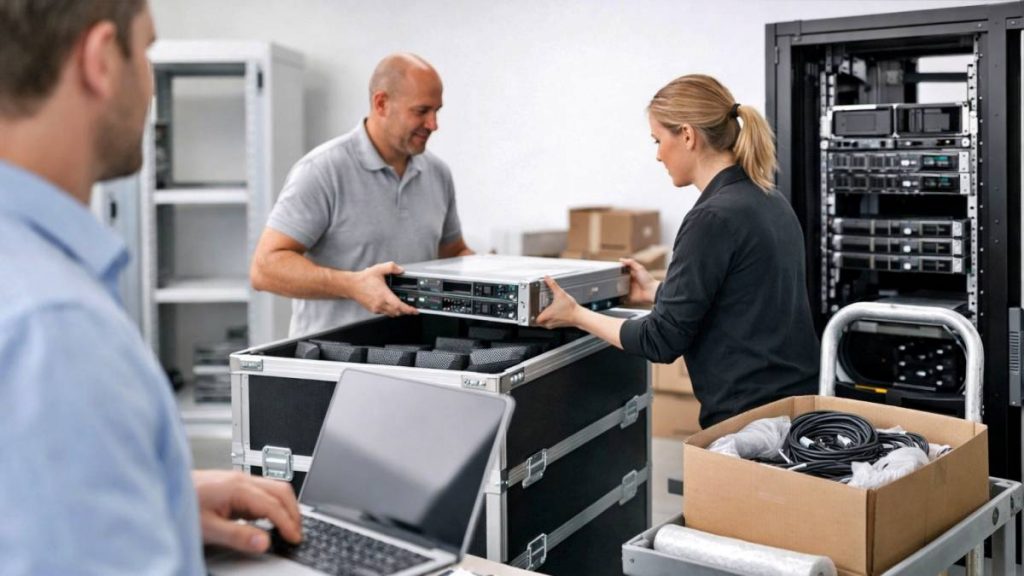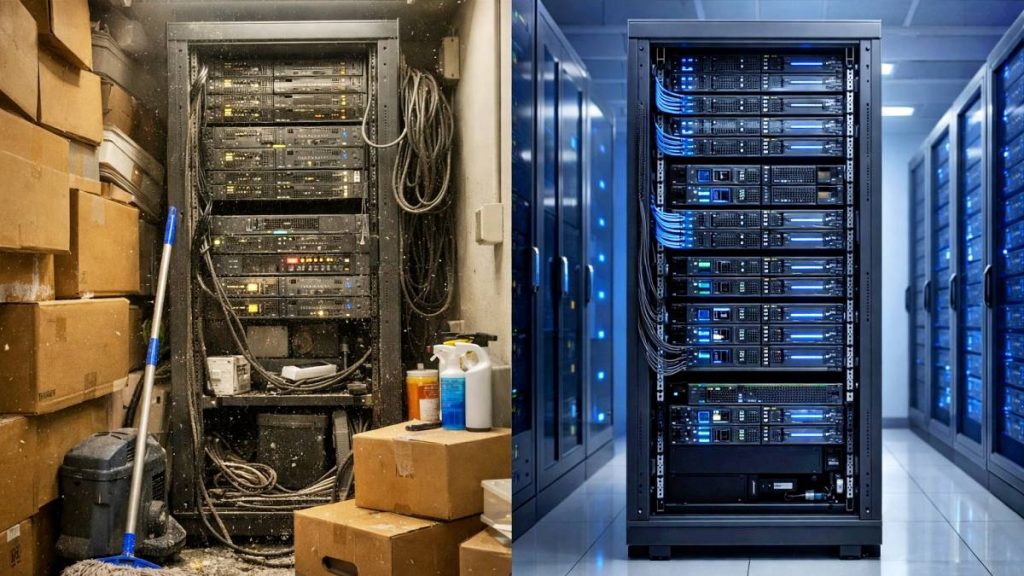
In today’s business environment, compliance is not optional — it is a necessity. For small businesses in regulated industries like healthcare, finance, and legal services, meeting data security requirements is critical for protecting sensitive information and avoiding costly fines, legal consequences, and reputational damage. Yet many small organizations that host servers and data storage on-premises struggle to achieve and maintain full compliance.
Colocation at a reputable, compliance-focused data center can help small businesses meet these demanding standards more effectively and affordably. This article will explore how data centers support regulatory compliance, focusing on HIPAA physical security requirements and the broader assurances provided by SOC 2 Type II compliant facilities.
The Growing Compliance Burden on Small Businesses
Regulatory bodies have made it clear: businesses of all sizes are expected to protect sensitive information with the same rigor. Unfortunately, small businesses often lack the dedicated IT and security resources needed to maintain compliant environments in-house. Common challenges include:
- Inadequate physical security for server rooms or computer closets
- Limited redundancy and backup systems
- Lack of environmental controls (such as fire suppression, temperature regulation, and flood protection)
- Poor access controls and monitoring
- Insufficient documentation for audits
Attempting to meet HIPAA, PCI-DSS, or other compliance standards with on-premises infrastructure can be risky and expensive. This is where data center colocation becomes a strategic advantage.
How Colocation at a Compliance-Focused Data Center Helps
When businesses colocate their critical IT infrastructure in a professional data center, they immediately gain access to an environment built to meet stringent compliance requirements. Key advantages include:
- Robust Physical Security: Professional facilities are designed with multilayered access controls, video surveillance, biometric scanners, and security personnel.
- Controlled Environment: Redundant power, cooling, and fire suppression systems protect hardware and data integrity.
- Documented Procedures: Access, maintenance, and incident response policies are well-established and available for audit purposes.
- Independent Audits and Certifications: Top-tier data centers obtain third-party certifications that validate their compliance posture.
Let’s look at two major compliance frameworks: HIPAA and SOC 2 Type II.
HIPAA Compliance and Physical Security: Why It Matters
Healthcare providers, insurance companies, and any businesses that handle protected health information (PHI) must comply with the Health Insurance Portability and Accountability Act (HIPAA). While much attention is given to electronic safeguards, HIPAA also imposes strict physical security requirements under the Security Rule.
Key HIPAA physical security requirements include:
- Facility Access Controls: Only authorized personnel should have physical access to systems that store or process PHI.
- Workstation and Device Security: Policies and procedures must exist to protect devices from unauthorized access and theft.
- Maintenance Records: Access logs and maintenance records must be kept for audit purposes.
- Contingency Planning: Facilities must ensure that data can be recovered and systems restored in case of disaster.
Hosting servers in an office closet or backroom rarely meets these standards. In contrast, a HIPAA-compliant data center provides:
- 24/7 monitored access control systems
- Mantrap entries, biometric scanners, and video surveillance
- Documented access logs and audit trails
- Redundant power and cooling systems to maintain uptime
- Disaster recovery and backup services
By colocating in a HIPAA-compliant data center, small businesses can confidently assert that they meet the physical safeguard requirements of HIPAA, significantly reducing their risk exposure.
The Broader Value of SOC 2 Type II Compliance
SOC 2 Type II is another important certification for data centers that indicates a high level of operational security and reliability. Developed by the American Institute of CPAs (AICPA), SOC 2 Type II focuses on five “Trust Service Criteria”:
- Security: Systems are protected against unauthorized access.
- Availability: Systems are available for operation and use as committed.
- Processing Integrity: Systems process data accurately, completely, and on time.
- Confidentiality: Information designated as confidential is protected.
- Privacy: Personal information is collected, used, retained, and disclosed appropriately.
For small businesses, partnering with a SOC 2 Type II compliant data center offers:
- Verified Security Controls: Independent auditors have tested and confirmed security measures.
- Proof for Client and Regulatory Audits: SOC 2 reports can be used to demonstrate compliance efforts.
- Confidence in Service Provider Practices: Ongoing operational excellence is verified.
Because SOC 2 Type II audits are performed over a period of time (usually six months or longer), they demonstrate that a data center doesn’t just have good policies — it consistently follows them.
Other Regulatory Standards and Colocation Benefits
While HIPAA and SOC 2 Type II are especially relevant for healthcare, finance, and legal sectors, a well-run data center can also support compliance efforts related to:
- PCI-DSS (Payment Card Industry Data Security Standard): Critical for businesses that process credit card payments.
- GLBA (Gramm-Leach-Bliley Act): Requires financial institutions to safeguard sensitive customer data.
- FERPA (Family Educational Rights and Privacy Act): Protects student education records.
- CJIS (Criminal Justice Information Services): Pertinent for businesses serving law enforcement clients.
Each of these standards demands strong physical and logical controls over data infrastructure — areas where professional colocation facilities excel.
Why On-Premises Hosting Falls Short
Many small businesses initially try to meet compliance requirements by securing their own on-site servers. Unfortunately, without significant IT budgets, this often results in:
- Inadequate physical access control (e.g., unlocked server rooms)
- Insufficient environmental protection (e.g., no backup power, poor cooling)
- Limited disaster recovery preparedness
- Difficulty maintaining access logs and audit trails
Even well-intentioned businesses often fail audits because physical security and operational resilience are hard to achieve and document internally.
Colocating infrastructure within a compliant data center immediately resolves many of these deficiencies, providing a safer, auditable, and more scalable platform for business-critical operations.
Choosing the Right Data Center Partner
When selecting a data center for colocation, small businesses should look for providers that offer:
- Demonstrated HIPAA compliance and SOC 2 Type II certifications
- Comprehensive physical and environmental controls
- Strong disaster recovery capabilities
- Clear policies and documentation for client audits
- Responsive support and client service
At Datacate, we understand the critical role that compliance plays in your business. Our facilities are engineered to meet the demanding requirements of HIPAA, SOC 2 Type II, PCI-DSS, and more — providing peace of mind and audit-ready infrastructure for your sensitive data.
Final Thoughts
For small businesses in healthcare, finance, and other regulated industries, achieving and maintaining compliance is essential — but it doesn’t have to be overwhelming. By colocating your IT assets in a professional, compliant data center, you gain immediate access to an environment designed to protect sensitive data, simplify audit preparation, and ensure business continuity.
Don’t let on-premises limitations put your compliance — or your business — at risk. Contact Datacate today to learn how our data center services can help you meet your compliance goals and focus on growing your business with confidence.







